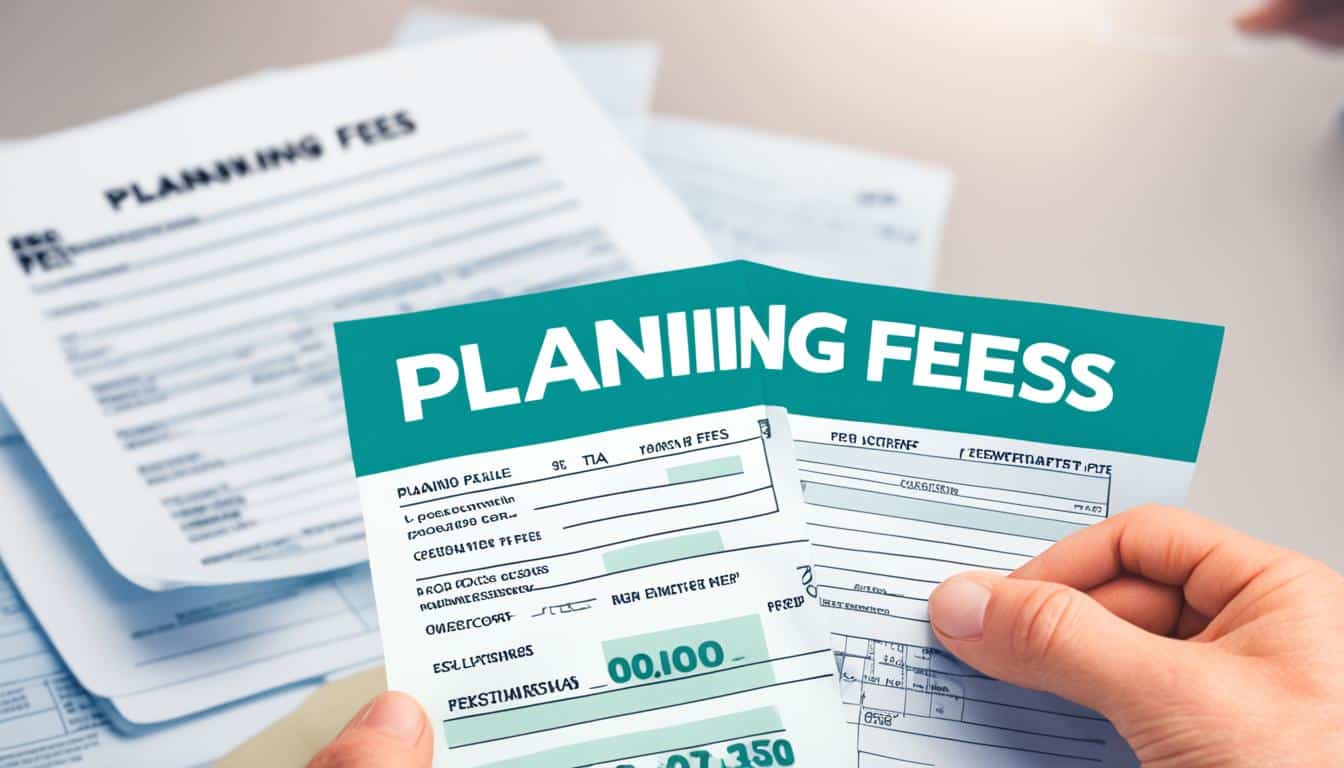Are planning fees tax deductible? That is often the question on the minds of individuals looking to manage their finances and plan for the future. The deductibility of planning fees has been a topic of interest for many, as it can significantly impact the overall cost of financial planning.
Let me tell you a short story to set the stage for our discussion on the tax benefits of planning fees.
Meet Sarah, a hardworking professional who decided it was time to take control of her financial future. She wanted to ensure that her loved ones would be well taken care of in the event of her passing and wanted to minimize any potential tax implications. With this in mind, Sarah sought the help of a financial advisor to guide her through the intricate realm of estate planning.
Sarah was well aware of the importance of creating legal documents such as trusts and wills, but she wondered about the deductibility of the planning fees involved. She wanted to ensure that her financial decisions were not only sound but also tax-efficient.
With the Tax Cuts and Jobs Act bringing about changes in IRS rules, Sarah was uncertain about the deductibility of estate planning fees. She knew that in the past, some of these fees were tax deductible, but recent changes had made it harder, if not impossible, to continue deducting them.
But here’s the catch:
While the Tax Cuts and Jobs Act limited the deductibility of most estate planning fees, there are still exceptions for small business owners like Sarah. Business succession planning remains deductible, providing Sarah with some relief.
- The Tax Cuts and Jobs Act made it harder, if not impossible, to deduct estate planning fees.
- Business succession planning remains deductible for small business owners.
- Consulting a financial advisor or tax expert is advisable to navigate the changing tax landscape.
- Keeping accurate records and seeking expert advice can help maximize potential deductions.
- Stay informed about changes in tax laws and regulations to make informed financial decisions.
Understanding Estate Planning and Its Costs
When it comes to planning your estate, there are a lot of factors to consider. You need to think about how you want your assets and property to be distributed after your death and ensure that your wishes are legally protected. This is where estate planning comes in.
Estate planning involves creating various legal documents, such as trusts and wills, to outline your instructions and wishes. These legal documents ensure that your assets are distributed according to your desires and that your loved ones are taken care of.
In addition to trusts and wills, estate planning may also include other important directives, such as a durable power of attorney and living wills. These documents give someone else the authority to handle your financial and healthcare decisions if you become unable to do so yourself. They provide you with peace of mind knowing that your wishes will be respected even if you’re unable to express them.
However, it’s essential to understand that estate planning can come at a cost. The complexity of your financial situation and the extent of services required can impact the overall cost of estate planning. Legal fees, accountant fees, and financial advisor fees may all be part of the expense.
But how much does estate planning typically cost?
The cost of estate planning can vary widely depending on numerous factors. Some of these factors include:
- The complexity of your estate: The more complex your financial situation, the more time and expertise required, which can increase the cost of estate planning.
- The type of legal documents needed: Different legal documents have different levels of complexity and may require additional time and resources to draft properly.
- The involvement of professionals: Enlisting the help of lawyers, accountants, and financial advisors can add to the overall cost of estate planning.
It’s important to understand that estate planning is an investment in the future. While the cost may seem significant, it pales in comparison to the potential benefits it offers. By planning your estate, you can have peace of mind knowing that your assets will be distributed as you wish, and your loved ones will be taken care of.
Now, let’s take a look at a table that provides a breakdown of the average costs associated with estate planning:
| Service | Average Cost |
|---|---|
| Creation of a basic will | $300 – $1,000 |
| Establishing a living trust | $1,500 – $3,000 |
| Durable power of attorney | $200 – $500 |
| Living will | $150 – $500 |
| Legal and professional fees | Varies based on complexity |
As you can see from the table, the cost of estate planning can depend on the specific services you require. It’s essential to consult with a qualified estate planning attorney to get an accurate estimate based on your unique circumstances.
Remember, estate planning is an investment in your future and the well-being of your loved ones. Consider the potential costs in relation to the peace of mind and protection it provides.
Changes in IRS Rules for Deductibility
Under the previous IRS rules, certain estate planning fees were eligible as an itemized deduction under miscellaneous deductions on Schedule A. These included legal fees for estate tax planning services that were incurred for the production or collection of income, the maintenance or management of income-producing property, or tax advice and planning.
However, the Tax Cuts and Jobs Act changed these rules, making most estate planning fees non-deductible. This means that fees for advice on income-generating instruments like income trusts or guidance on property transfer methods are generally not deductible anymore. It’s important to note that some fees, such as estate planning relating to simple property transfer or the use of estate planning instruments like powers of attorney and living wills, were not deductible even before the tax changes.

Overview of Changes in IRS Rules for Deductibility
| Old IRS Rules | New IRS Rules |
|---|---|
| Estate planning fees eligible for deduction under miscellaneous deductions on Schedule A | Most estate planning fees are now non-deductible |
| Legal fees for estate tax planning services related to income production or collection, property maintenance or management, and tax advice or planning | Fees for advice on income-generating instruments like income trusts or guidance on property transfer methods are generally not deductible |
| Some fees, such as estate planning for simple property transfer or the use of powers of attorney and living wills, were already not deductible | No significant changes for certain non-deductible estate planning fees |
While the changes in IRS rules have limited the deductibility of estate planning fees, it’s important to consult a tax advisor or financial expert to understand how these changes specifically affect your individual situation. They can provide guidance on any remaining deductible expenses and help you navigate the complexities of estate planning in light of the new rules.
Exceptions to Non-Deductible Estate Planning Fees
While most estate planning fees are non-deductible, there are exceptions that can save you money. According to IRS Publication 529, certain specialized estate planning services may still qualify as miscellaneous deductions. These deductions can include fees for:
- Producing or collecting income
- Maintaining or managing income-producing properties
- Tax advice and planning
For instance, if you seek estate planning advice on constructing an income-generating trust, or guidance on minimizing estate taxes through strategic asset transfers, you may be able to deduct the associated legal fees. Remember, though, that miscellaneous deductions were temporarily suspended until 2026 due to the Tax Cuts and Jobs Act.
Here’s a visual breakdown of the deductibility exceptions:
| Specialized Estate Planning Services | Eligibility |
|---|---|
| Producing or collecting income | Qualifies for deduction |
| Maintaining or managing income-producing properties | Qualifies for deduction |
| Tax advice and planning | Qualifies for deduction |
Keep in mind that the deduction limits and eligibility criteria may vary, so it’s wise to consult with a tax professional to ensure you fully understand the implications and guidelines.
Minimizing Taxes with Strategic Planning
By leveraging the exceptions to non-deductible estate planning fees, you can potentially reduce your overall tax burden. Expert guidance can help you develop a comprehensive strategy that aligns with your financial goals.
Limits and Considerations for Deductible Estate Planning Expenses
As a beneficiary of a trust or an estate, it’s crucial to understand the limits and considerations surrounding tax deductions that you can claim in your tax returns. While you have the opportunity to request tax deductions for financial or capital losses, it’s important to note that contributions to charities that surpass your gross income may not qualify for a deduction.
But how do estate administration fees factor into the equation?
Estate administration fees, including those associated with estate tax returns, may be deductible by the estate or trust. However, it’s essential to understand that these fees are considered taxable ordinary income for the personal representative or fiduciary.
Let’s break it down further:
| Expense | Deductibility |
|---|---|
| Financial or capital losses | Generally deductible |
| Charity contributions | Subject to limitations |
| Estate administration fees | Deductible by the estate or trust |
It’s crucial to grasp the difference between estate tax and estate income tax, as well as any specific rules and limits dictated by the IRS for tax deductions. This will enable you to make informed decisions and optimize your tax benefits accordingly.
Considering the complexity of estate planning and tax laws, consulting with a financial advisor or tax expert is highly recommended. They can provide you with personalized guidance and help navigate the intricacies of deductibility to ensure you’re maximizing your tax deductions within the confines of the law.

Don’t overlook the importance of record keeping
When it comes to claiming tax deductions for estate planning expenses, maintaining accurate records is paramount. Having clear documentation from your attorney that outlines the tax-deductible services provided is essential in substantiating your claims. Attorneys can often issue separate invoices for deductible and non-deductible legal fees, helping facilitate the deduction process.
Additionally, familiarize yourself with the IRS’s 2% rule on miscellaneous deductions. This rule limits the deductions allowed based on your remaining taxable income after subtracting 2% of the adjusted gross income. Staying organized and having a comprehensive understanding of the rules and regulations will position you for success when claiming deductions.
Changes in Tax Laws and the Possibility of Deductions in the Future
The deductibility of estate planning fees is subject to changes in tax laws and policies. The Tax Cuts and Jobs Act made most estate planning fees non-deductible, but don’t lose hope just yet! Many provisions of the act are set to expire at the end of 2025. And who knows, with the ever-changing political winds in Washington, there’s a chance that deductions for estate planning fees could make a comeback before then!
To stay ahead of the game, it’s crucial to stay informed about changes in tax laws. Consult with a financial advisor or tax expert to understand the current landscape and develop strategies for managing your estate planning expenses. After all, it’s your hard-earned money, and you should make the most of every available tax deduction!
Remember, tax policies can change with the stroke of a pen, so it’s important to keep your finger on the pulse of any updates. By staying informed and seeking expert advice, you can navigate the complex world of tax laws and potentially find ways to optimize your deductions.
But wait, what about the future?
The future of tax deductions for estate planning fees is uncertain, but one thing is for sure – they depend on the political winds and changes in tax policies. While the Tax Cuts and Jobs Act dealt a blow to their deductibility, it’s always possible that future legislation could restore these deductions. With every election or change in government, tax policies and priorities can shift, leading to new opportunities for taxpayers.
So, keep an eye on the news, follow the debates, and exercise your civic duty by staying engaged with the political process. Who knows, your voice and vote could be influential in shaping tax laws and policies that impact your financial planning.
Strategize, adapt, and thrive!
In the world of taxes, one thing is certain – change is inevitable. While it can be frustrating to navigate shifting tax laws and policies, it’s important to adapt to the new landscape and seize every opportunity for tax deductions. By working closely with knowledgeable financial advisors and tax experts, you can develop effective strategies that optimize your estate planning expenses and minimize your tax burden.
Remember, tax laws are complex and subject to interpretation. Even seemingly minor changes in legislation can have significant impacts on your financial planning. That’s why it’s crucial to rely on experts who understand the intricacies of tax codes and can guide you through the ever-changing tax landscape.
So, embrace change, stay informed, and seek expert advice. By doing so, you’ll be well-equipped to navigate the twists and turns of tax laws, maximize your deductions, and ultimately secure a brighter financial future.
Importance of Keeping Records and Seeking Expert Advice
When it comes to maximizing your tax deduction claims for legal fees, accurate record-keeping is key. It’s essential to maintain detailed documentation of your financial affairs to support your claims and ensure compliance with IRS rules.
When claiming deductions for estate planning fees, it’s necessary to have clear documentation from your tax attorney or legal advisor. This documentation should clearly state the nature of the tax-deductible services provided. Attorneys may issue separate invoices for deductible and non-deductible legal fees, so it’s important to review the invoices and communicate with your attorney to ensure you claim the appropriate deductions.
Seeking the advice of a tax attorney who specializes in estate planning can also be beneficial. They can provide guidance on the percentage of estate planning fees that may be deductible based on your specific situation. They can help you navigate the IRS rules and regulations, ensuring that you claim all the deductions to which you are entitled.
It’s important to understand the IRS’s 2% rule on miscellaneous deductions. This rule limits deductions based on the remaining taxable income after subtracting 2% of the adjusted gross income. By keeping accurate records and seeking expert advice, you can ensure that you are fully aware of the deductibility of your estate planning expenses and maximize your tax benefits.
Tax Deduction Record-Keeping Checklist
- Maintain copies of invoices and receipts for estate planning services
- Keep a record of consultations and meetings with your tax attorney
- Organize documents related to the creation of legal documents such as wills, trusts, and power of attorney
- Document any tax advice or planning provided by your attorney
- Track any expenses related to producing income or managing income-producing properties
- Be familiar with the IRS rules on deductible expenses and consult with a tax attorney for guidance
By following these record-keeping practices and seeking expert advice, you can ensure that you accurately claim tax deductions for your estate planning fees, potentially reducing your taxable income and maximizing your overall tax savings.
| Documents | Purpose |
|---|---|
| Legal fee invoices and receipts | Support deduction claims for estate planning fees |
| Consultation and meeting records | Evidence of discussions and tax planning advice |
| Documents related to legal documents (wills, trusts, power of attorney) | Confirmation and details of estate planning arrangements |
| Tax advice and planning documentation | Support deductions related to tax advice and planning services |
| Expense records for income-producing properties | Substantiate deductions for managing and maintaining income-producing properties |
Remember, accurate record-keeping and seeking professional advice are crucial steps in navigating IRS rules and maximizing your tax deductions for estate planning fees.

Understanding the Tax Landscape for Estate Planning
The tax landscape for estate planning can be as complex as navigating a labyrinth while blindfolded. With the implementation of the Tax Cuts and Jobs Act, the rules have been shaken up like a snow globe during a winter storm. One significant change is the doubling of the estate tax exemption and lower tax rates, making it essential to grasp these alterations when preparing your estate plan.
Let’s break it down: estate tax is levied on the cumulative assets left after an individual’s demise, while estate income tax applies to the income generated by the estate itself. Additionally, it’s crucial to understand that estate tax rules vary between federal and state levels. Some states have their own estate tax laws, creating even more twists and turns in the tax landscape.
For those with substantial estates, considering the potential impact of estate taxes is like playing a game of strategic chess. While the rules may seem overwhelming, working with an experienced estate planner can be your knight in shining armor. They can guide you through the ever-changing terrain, helping you make informed decisions and minimize your tax burden.








